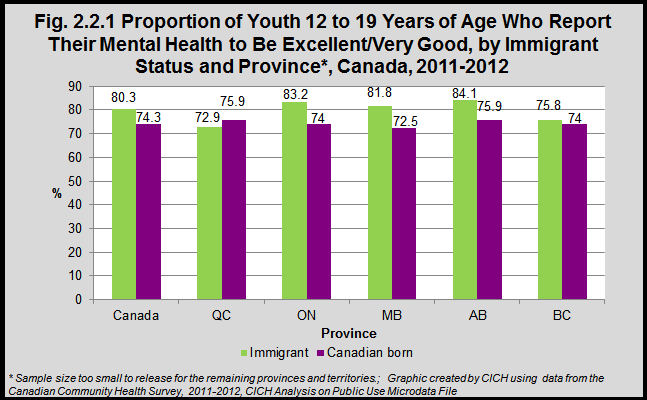Proportion of Youth, 12-19, Who Reported Their Mental Health as Excellent/Very Good, 2011-2012

The majority, 80%, of immigrant youth aged 12 to 19 years report that their mental health is excellent or very good. That compares to 74% of Canadian-born youth. Those proportions are the same for young men and young women in both groups. Immigrant youth in Québec and BC are less likely to report that their mental health is excellent or very good compared to their counterparts in Ontario, Manitoba and Alberta.
Implications
These data indicate that immigrant youth are somewhat more likely to report that they have excellent or very good mental health, but the data also show that this is not consistent across the country. Research based on the New Canadian Children and Youth Study indicated that children in immigrant families from Hong Kong, Mainland China, and the Philippines living in Toronto and Montreal were at higher risk of emotional problems than were children in immigrant families in Winnipeg, Calgary, Edmonton, and Vancouver.1 The study found that predictors of the mental health of immigrant youth are complex – immigrant human and social capital, home-school relationships, marginalization and lack of community supports were predictors – but their effect varied across regions. The authors conclude that “Although the expectations may not be unreasonable, simply admitting immigrants and then forgetting about them, or even punishing them by withdrawing support, is not only unreasonable, but bad for mental health”.2
1Beiser M, Zilber N, Simich L, Youngmann R, Zohar BT and Hou F. Regional effects on the mental health of immigrant children: Results from the New Canadian Children and Youth Study (NCCYS). Health & Place 17 (2011) 822-829.
2Ibid, p. 828.
